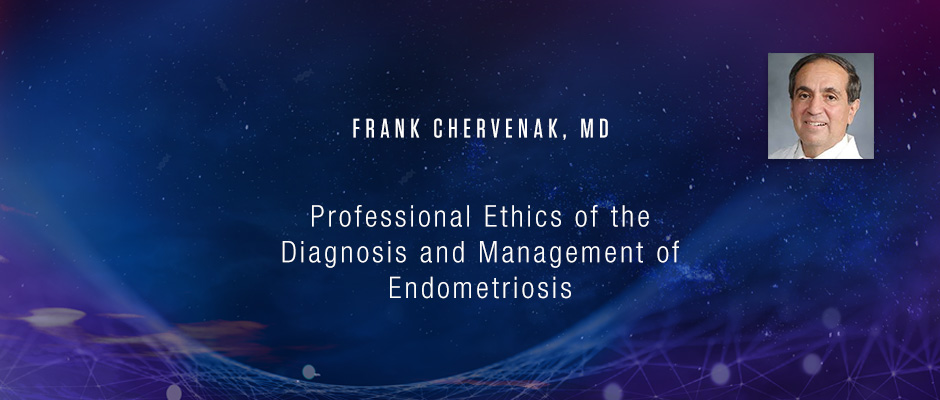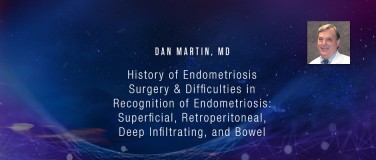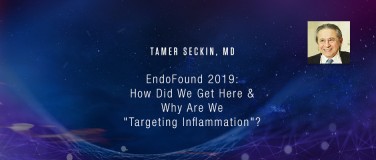Professional Ethics of the Diagnosis and Management of Endometriosis
Frank Chervenak, MD
Endometriosis Foundation of America
Medical Conference 2019
Targeting Inflammation:
From Biomarkers to Precision Surgery
March 8-9, 2019 - Lenox Hill Hospital, NYC
It's a pleasure and privilege to be with you this morning. As Dr.Seckin said, I'm a new chairman here. I've only been here a few months. As I'm a relative newcomer, it's a thing of beauty to be here and experience a wonderful culture, a wonderful culture where people are benevolent. This is not an overstatement. I see some of our attendings here. I was talking to somewhere people get along marvelously. There are pockets of excellence here. Please.
When I came here, it was terra incognita, even though I was less than a mile away. One of these pockets of excellence was what's going on here in endometriosis. You've heard here, there were 25 cases of a diaphragm with endometriosis. This is unheard of. Where else does this go on in the world?
I was delighted to see what Dr. Seckin and his team is doing. So when he asked me to be part of this, I'm happy to do it. Where I think those of you who know me know that I do not deal with endometriosis and have not done this since the time of my residency. My career has been in maternal-fetal medicine and obstetrics. I rely on my discussions with him and his team to have put this presentation together.
Now to advance this. Oh, it's very simple. I've put this together with my partner of 35 years. I only believe in long-standing relationships. Larry McCullough, and we're going to talk a little bit about some clinical ethical challenges in endometriosis. We have to give some definitions, apply these clinically, and a little bit about historical perspective.
The first thing I have to convince you of why are we even having this discussion? Why have a discussion about ethics in this scientific program on endometriosis? I want to convince you ethics has something important to say in the day to day management of endometriosis. When you see patients with the diagnosis of endometriosis with no documentation and an inappropriate workup that you get in consultation. Patients who've been worked up with negative results, but symptoms persist and the diagnosis has been given notwithstanding. These are realities.
Patients who insist that their self-diagnosis is correct despite the absence of findings. This I'm told is part of the reality that many of your face. What about management? Patient choice, sometimes demand medical and surgical management that's not indicated. We hear too much about the entitlement of patients. Patient request for narcotics and the risk of addiction when it's an undocumented benefit. Patients who accept management but do not allow enough time for them to become effective. Patients who are seeking secondary gains such as justifying absence from school or disability claims.
I hope I've convinced you that there are real issues here. There real issues here that many of you face in your care of patients.
Before I can even touch on this, a few basic definitions. I promise to go fast and just to keep the jargon to a minimum. Beneficence, in a word, is our charge, is what we are as doctors, where this is not any religion. It's a secular principle whereby we do the best we can for our patient and it's based on evidence. We present medically reasonable options.
Forgive me if I go quickly, but I want to be succinct here.
Patient preferences by themselves do not establish reasonableness. I believe the pendulum has shifted too far and we've written extensively about this. Just because a patient demands or requests something doesn't make it reasonable and there are times we have to say no.
Respect for autonomy is an important counterbalance toward what we believe is best. The informed consent process empowers the patient with information to make choices among reasonable options and to make recommendations. I'm a believer in shared decision making when choices need to be made. When the choice is clear, you make recommendations. Sometimes ethicists are squeamish and say we shouldn't make recommendations. Of course, you make recommendations when the choice is clear.
Professional integrity, so important. Practice medicine, conduct research and teach to the standards of intellectual and moral excellence. Please, we could go on and on about what this means. We've written extensively about this. I don't have to tell this group, your leaders of this.
Conflicts of interest that's so important. Again, you're leaders, but I'm sure you see people in the community where this is faced. Conflicts between the core ethical obligation to do the best you can for the patient and prevent economic conflicts of interest. In other words, to maximize financial gain and noneconomic conflicts of interest, convenience and avoiding aggravation. Again, we must be professionally responsible management of conflicts of interest, adherence to professional integrity.
We're going to talk about John Gregory and where this comes from at the end. But I'm moving quickly just to touch, to titillate your interest, on how this applies to your practice of endometriosis
Professionally responsible diagnostic workup, and I know I'm preaching to the converted, but you deal with many people who don't practice this way. Their risk of the incomplete workup. It's more convenient for the physician to treat symptoms rather than to work up the causes and to design the appropriate treatment plan. Conversely, there's the risk of an excessive workup. I've heard stories where excessive biopsies are done and doctors charge excessive fees for doing excessive biopsies, which is of course unprofessional.
When a highly reliable histological diagnosis can be made. All of the ethical principles are in alignment and this is what should be done. Negative results. Rule out the diagnosis of endometriosis, necessitating additional workup to identify other causes including psychiatry and appropriate consultation, not to churn this and generate other fees.
Adhering to this approach, this is what the professionalism dictates. Again, I emphasize this and I've heard that there violations of this.
Now let's talk about management. Management based only on symptoms put the patient it preventable risk of harm. Their risks of the iatrogenic risk of mistreatment, undertreatment and overtreatment, a risk of irreversible stress and anxiety, the diagnostic hunt, risk of loss of trust of physicians. This is a big risk. Management based solely on symptoms violates professional integrity that we've talked about. Beware of responding to vulnerable patients with false promises of the success of clinical management. I think you've heard from Dr. Seckin, from the very few vignettes he gave, how difficult these patients can be. Don't give simple answers, especially patients with concurrent mental disorders such as anxiety and depression. You're going to do much, much harm. Professional integrity requires educating patients about the limits, not to make false promises about such complex conditions.
Pain management is so important and this is so critical. Again, there's the beneficence obligation to prevent effectively and manage unnecessary pain. But beware, conflicts of interest here. Treating pain to keep the patient happy and coming back for financial gain is inappropriate. Treating pain to shorten the patient visit and minimize other aggravation is again inappropriate. There's the obligation based on integrity to prevent the iatrogenic risk of inappropriate pain management.
We all know this issue of the opioid epidemic. We have to get to the etiology and treat it rather than just smooth it over with pain medication. The ethical obligations support patients who will be used to live with chronic pain that can be safely eliminated. Assure that the patient needs are met by coordinating a multidisciplinary, longitudinal team with appropriate consults. Be aware of the limits and use appropriate consultations.
There are autonomy based obligations. A patient who requests that everything that needs to be done does an established standard of care. Please. Sometimes we say no to patients. That's the ethically correct thing to do. Don't be seduced that because a patient wants something, it's the ethically correct thing to do. It's to transform the request into informed decisions about what's medically reasonable.
I know I've gone very quickly, but I want to close very succinctly with something that I believe that's so important. I usually speak to an obstetric audience, but this is a GYN audience. To give this a historical perspective that's so important, now more than ever, about the history that's so critical, so that everyone knows where professionalism comes from. I serve as chair of the [inaudible 00:12:49] ethics committee and us fact changed the name from, it's no longer just the ethics committee. It's professionalism.
People, Doctors don't realize that professionalism didn't start from Hippocrates. Sure. Hippocrates was the father of medicine from ancient Greece, but it was two millennia later. It wasn't until 18th century Great Britain that professionalism started. For 2000 years, medicine was a guild. All we cared about was making money. It was a great physician-philosopher, John Gregory, who had a revolutionary concept. The patient comes first. It's fine to make money, please. I argue and I make a strong argument. We're entitled to above average salaries for all the work we do and the medical school and everything else. But the patient comes first and this is what's critical. He came from a time where there was fierce competition among physicians, midwives, quacks, and his concept and his contemporary Thomas Percival were revolutionary that the physician should put the patient first, protect the patient's interest above all else. It's fine to make money, but the patient's interest comes first. There's a public trust in medicine. I can't emphasize this concept enough.
These concepts spread like wildfire across the world. They were accepted into the United States to the AMA code of ethics. We accept them today. I put this slide up. It's from Great Britain from the time of Gregory and I look at Dr. Seckin. He's a model of what the ideal ObGyn is. On the one hand, it's science. At the time, this was the Chamberlain, forgive me, I'm an obstetrician, not a gynecologist by background. You see the Chamberlain forceps, on the blue melded with the virtues, the compassion of a midwife. I would argue all of you, I know this conference is on science, we must remember. I'm so glad [inaudible 00:15:11] to put ethics front and center on this, that as we pursue the science of endometriosis, it must be melded with the professionalism, the virtues of what it means to be a physician. This is what we're all about, and I can't emphasize enough. I know this you take very seriously that we must have both to achieve the goals that you want to achieve.
Thank you so much for the privilege of being with you this morning. Thank you so much.










